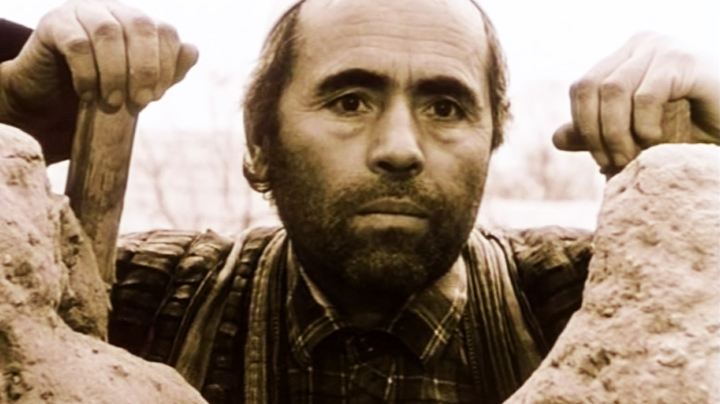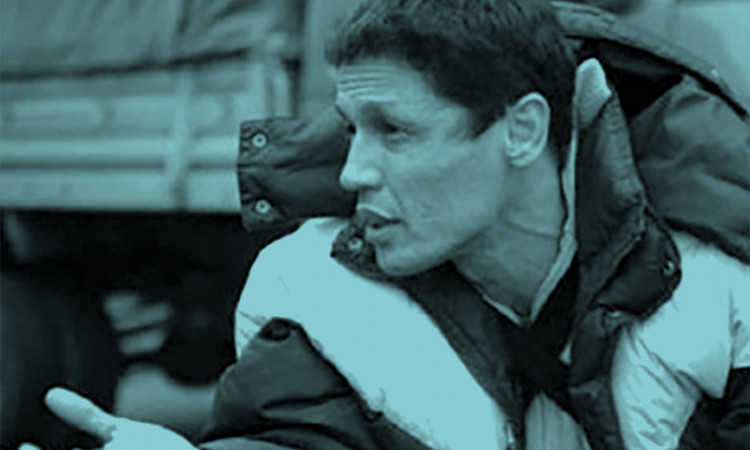Fly of a Bee

May 22, 2020 - May 29, 2020
In a small village in Tajikistan, an impudent rich man builds a toilet in the yard that stands at the window of his neighbor, a rural teacher. Outraged by the constant unpleasant smells and convinced that a neighbor is spying on his wife, the teacher begins to fight against the arbitrariness of the rural rich man.
The things you will do because of your amazing love of movies…
“Since my childhood, I loved movies very much. I always went to the cinema, which was located in my village. Up to fourth grade, I studied with excellent marks and for every good mark, my mother gave me 10 kopecks, which was the cost of a ticket to the cinema. But at some point in my life, I got involved with hooligans. Of course then I was not given 10 kopecks, but my passion for movies did not disappear, so I had to steal money from my parents.”
Interview
Anastasia Galimova and Victoria Kogay, CCA LAB Participants
The Tajik filmmaker Jamshed Usmanov is a significant figure in the cinema of Central Asia. In the works of the director, there is a sense of freedom of thought and a striking relevance to the timely topics covered. The film Flight of the Bee once again reminds the audience that everyone has the right to defend their honor and fight for the truth, regardless of their social and financial status. Sometimes, using folk wisdom, you can put in place even the most noble rooster.
When viewing your films, you can see a common feature — the legend that underlies the plot. Is there any legend that has influenced your worldview?
Legends are an integral part of Central Asian culture; every village and family has its own legends that are literally passed down from generation to generation. In fact, not all of my works trace legends, and if they are used, then they are a tuning fork to the main story, giving it a stronger sound. As for the Flight of the Bee, it is worth noting that the legend alluded to in the film is related to my family. A similar story happened to my great-grandfather. He very much wanted to restore social injustices and decided to take revenge on the rich man who built a toilet near his house, but the problem could not be solved peacefully. My great-grandfather decided to turn to the rais, but he refused to help. In the end, my great-grandfather built a toilet for the entire village near this other man’s house!
The film Flight of the Bee dwells on issues related to social injustice and politics. Do you think that there have been any changes in the ideology and social structure of the people of Central Asia?
Everything has changed and nothing has changed at the same time. However, social injustice still exists in one form or another. Yes, sometimes it can be presented in a milder form, but its presence is unavoidable. As for changes, it is actually as difficult to judge the modern world as it is to judge different periods. So, for example, in my youth there seemed to be social justice, but there was also a party elite with special privileges. Perhaps now something has changed: there is more freedom. People have become more open, and maybe this is because of the development of technology. Now we can find anything, it gives a certain freedom, and maybe only a sense of freedom. But because of this rapid development there are various problems, therefore it is necessary to ask of humanity: are we ready to innovate? Well, that's a different question.
Each person has their own life position; what is the basis of yours? Perhaps there is some phrase that accompanies you all your life?
You know, when we were young, we had the Communism Builder Сode; in fact, everything was decided for us. Now everyone lives with their own ideas and builds for themselves. But a person in any era has the right to create himself. My attitude in life is based on the desire to be free. As Chekhov said: "get the slave out of yourself little by little”. And if we talk about specific truths that have accompanied me all my life, they were told to me by my grandmother as a child: "get up early and start your day with work", "don't steal", "don't gamble". The position may change, but the principles remain.
As we know, you filmed your work in the north of Tajikistan, where you were born. Is there a special meaning to this?
I believe that a filmmaker should shoot about what he knows best. And my ancestors and I were born in Ashta. I know not only the people there, but I know literally all the trees and stones. For me, this small world is a cast of the vast world. But, also, literature and cinema have influenced my desire to shoot pictures in my native place. First of all, these are books by William Faulkner, who invented a district and filled it with various characters, even created a map of the territory. He knew everything about this created place, so it became easier to describe the district and the characters. After reading his books, I thought that I could also shoot a movie in a familiar place — Ashta. I shot 4 of my works there.
What are the perspectives of the cinema of Tajikistan and Central Asia in general?
After the Civil war, many filmmakers left Tajikistan, and the new era of cinema began literally from scratch. As for modern cinema, I am not very familiar with the works of Central Asian filmmakers, but I would like to note that Kazakh cinema often screened at European festivals. I think they have a fairly successful school of cinematography. It is quite difficult to say anything about other countries.
Did you manage to continue your work in Paris, find inspiration and feel a European mentality?
As I mentioned earlier, it's good when the filmmaker shoots what he knows well. But I decided to shoot in France the picture Romance of the Wife. I wanted to try to work on a great movie with power. There are a lot of original directors and it is difficult to surprise someone, so you have to work faster. I think it's a pretty unique experience.
What are the main criteria for choosing actors for your work?
I am equally interested in working with both professional and non-professional actors. I believe that they complement each other. According to observations, an amazing thing has turned out: often, professional actors are stamped, and once in the frame with a person from the street, a professional actor plays quite differently. Also, during the shooting, I forget about the script, and all the good things that are lying around I add to the film. For example, when choosing actors in the picture Flight of the Bee there was a rather interesting situation. Remember the precinct officer from the movie? So he accidentally came to me for shooting. I had a projectionist from Korea who didn't know the language, and we were shooting in the market. I went out for a while, I came back, and the operator had already gotten arrested! The policeman thought he was a spy and closed him in the bullpen, and later me as well. All this time I was surprised how cinematic the policeman was, so we became friends and I decided to use him in my film. In general, when shooting films, I rely on observation and experience.
Could you give some advice to the younger generation of filmmakers?
You know, there was an amazing poet and here he said a good phrase: "Sitting on the seashore, you will never find the pearl you are looking for, you must find water and not be afraid to end up in the belly of a whale". Do not be afraid of anything, because youth is given to the bold, and everything is quite simple.
